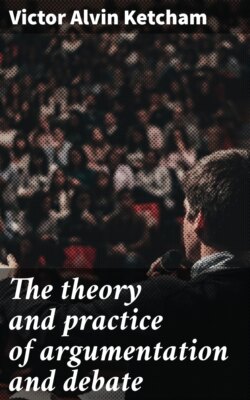Читать книгу The theory and practice of argumentation and debate - Victor Alvin Ketcham - Страница 13
На сайте Литреса книга снята с продажи.
1. The subject must be interesting.
ОглавлениеThe subject must be one in which both speaker and audience have a real interest. If the argument is written the subject must be one in which the readers are interested. With this object in view, the question selected should be practical rather than theoretical. That is, it should be a question the final determination of which will affect the welfare of the individual, the community, or the nation. No longer can interest be aroused in a discussion of whether the pen is mightier than the sword, or whether fire is more destructive than water. Objectionable in like manner are the following questions taken from a book on debating published in 1869: “Who is the most useful to society: the farmer or the mechanic?”, “From which do we derive the greatest amount of pleasure: hope or memory?”, “Are lawyers a benefit or a curse to society?”, “Is there more pleasure in the pursuit than in the possession of a desired object?”, “Who most deserves the esteem of mankind: the poet, the statesman, or the warrior?”, and “Whether there is more pleasure derived from the eye or the ear?” These and all similar subjects should be avoided chiefly because they lack interest, since no practical result can follow their determination. As well might one try to interest a modern audience in the discussions of the ancient schoolmen, who grew eloquent over a dispute as to how many angels could dance on the point of a needle, whether there could be two hills without an intervening valley, and whether God could make a yardstick with only one end. If men are to be interested the speaker or writer must get close to the questions which affect their everyday life at home and at work. If he does this and his ideas are worth defending he will always find willing hearers and readers.
Among interesting subjects for debate, questions of a local character hold an important place. The advisability of building a town hall, an athletic field, or a new bridge is very often more productive of genuine interest than some weighty problem of national politics. Such questions come close to the tax-payers and residents of any community, and at the same time appeal to their pride, prejudice, and ambition. If the student will but look about him he will find an abundance of controverted local matter which will furnish excellent subjects for oral or written arguments.
After the student has exhausted local subjects he may turn his attention to the broader controversies of state and nation. Here the questions of taxation, tariff, commerce, and international affairs afford ample scope for the full development of the debater’s powers. The list of subjects in the appendix may be found helpful in making a proper selection, but preference should always be given to questions in which the people at large are showing an active interest at the time of the debate. What this interest is may be determined by consulting the current numbers of the most widely circulating magazines and newspapers, such as the “Independent,” “Nation,” “Harper’s Weekly,” and the various city newspapers.
